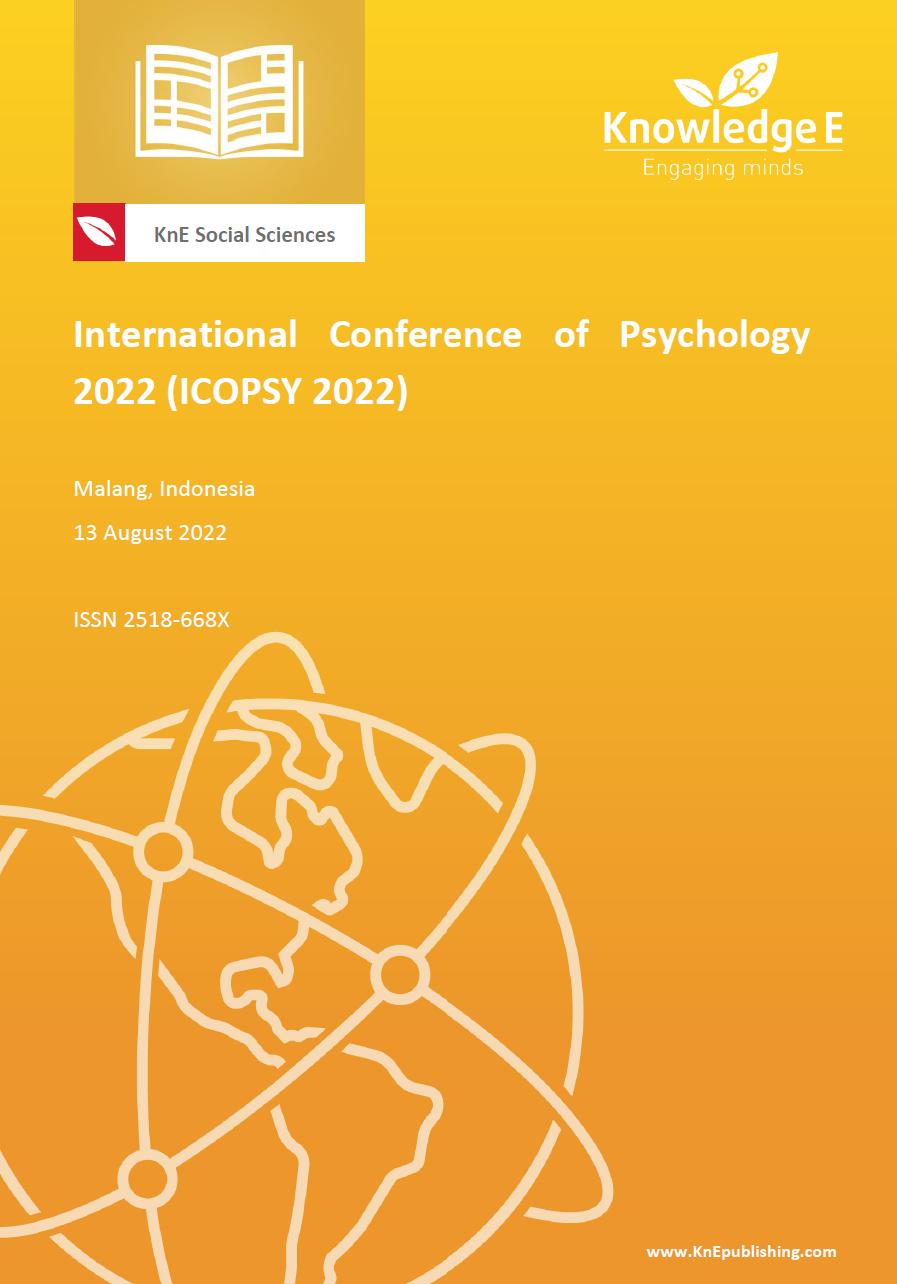Psychological Capital as a Predictor of Organizational Commitment of Executive Board Administrators of Faculty at State University of Malang
DOI:
https://doi.org/10.18502/kss.v7i18.12384Abstract
Previous research on psychological capital and organizational commitment in education or student organizations is still very limited, and no research has been conducted during the transition period from pandemic to endemic. This study aims to determine the contribution of psychological capital to organizational commitment simultaneously and partially. The subject of this study is the management of the Faculty Student Executive Board at UM for the period of 2022. The instruments used are Meyer and Allen’s scale of organizational commitment and Luthans’ scale of psychological capital. The analysis of the research data used is multiple linear regression analysis. The results showed that the F-test = 12.873 (p < .05), which means that psychological capital (self-efficacy, resilience, optimism, and hope) had a concurrent effect on organizational commitment and the results of the coefficient of determination (R-squared) showed a contribution of psychological capital (self-efficacy, resilience, optimism, and hope) of 29.9%. The results of t-test showed that self-efficacy dimension t=3.190 (p < .05) and hope dimension t=2.583 (p < .05), which means that self-efficacy and hope have partially significant influence on organizational commitment. The results of the t-optimistic test are t=.660 (p > .05) and the resilience dimension t=.161 (p > .05), which means that it has no significant influence on organizational commitment. The contribution of effective self-efficacy donations was 16.20% and the effective contribution of hope was 10.10%. Suggestions for organizations or administrators to improve self-efficacy are to provide positive feedback, social recognition, to give management experience of mastery.
Keywords: psychological capital, organizational commitment, management
References
[2] Msn.com. Kemenkes Sebut Kasus Konfirmasi COVID-19 Terendah Sejak Januari 2022. Tribun-Papua.com. 2022, March 15. https://www.msn.com/idid/ berita/other/wajib-coba-ini-daftar-kulineran-khas-daerah-favorit-ganjar-pranowodari- penjuru-nusantara/ar-AA13LXdK?infiniteIframe=1
[3] Robles MM. Executive Perceptions of the Top 10 Soft Skills Needed in Today’s Workplace. Business Communication Quarterly. 2012;75(4):453-465. https://doi.org/10.1177/1080569912460400
[4] Yulianto A. Pengaruh Keaktifan Siswa Berorganisasi Terhadap Peningkatan Soft Skills dan Prestasi Belajar Siswa Kelas XI Kompetensi Keahlian Teknik Pemesinan SMK Muhammadiyah Prambanan Tahun Ajaran 2014/2015 [Skripsi, Universitas Negeri Yogyakarta]. ePrints@UNY. 2016. http://eprints.uny.ac.id/id/eprint/32704
[5] Setar SB, Buitendach JH, Kanengoni H. The Moderating Role of Psychological Capital in The Relationship Between Job Stress and The Outcomes of Incivility and Job Involvement Amongst Call Centre Employees. SA Journal of Industrial Psychology. 2015;41(1):13. https://doi.org/10.4102/sajip.v41i1.1183
[6] Muis MR, Jufrizen J, Fahmi M. Pengaruh Budaya Organisasi Dan Komitmen Organisasi Terhadap Kinerja Karyawan. Jesya (Jurnal Ekonomi Dan Ekonomi Syariah). 2018;1(1):9-25. https://doi.org/10.36778/jesya.v1i1.7
[7] Melizawati M. Pengaruh Komitmen Organisasi Terhadap Kinerja Karyawan (Studi Kasus pada PT. Indotirta Abadi di Gempol Pasuruan). Jurnal Akuntansi AKUNESA. 2015;3(3):1-17.
[8] Akoto EO, Akoto EV. The Configural Approach to Organisational Commitment: An Application in Ghana. SA Journal of Industrial Psychology. 2014;40(2):11. https://doi.org/10.4102/sajip.v40i2.1207
[9] Saputra NAG, Nuridja IM, Suwena KR. Pengaruh Karakteristik Individu Terhadap Komitmen Organisasi pada Karyawan Aditya Beach Resort Lovina, Singaraja Tahun 2014. Jurnal Pendidikan Ekonomi Undiksha. 2015;5(1):Article 1. https://doi.org/10.23887/jjpe.v5i1.5083
[10] Dewi NANP. Pengaruh Psychological Capital Terhadap Komitmen Organisasi pada Karyawan [Skripsi, Universitas Muhammadiyah Malang]. UMM Institutional Repository; 2017. https://eprints.umm.ac.id/43570
[11] Yusuf RM, Syarif D. Komitmen Organisasi. Makassar: Nas Media Pustaka; 2018.
[12] Meyer JP, Allen NJ. TCM Employee Commitment Survey Academic Users’ Guide 2004. The University of Western Ontario: Department of Psychology. 2004. https://www.employeecommitment.com/TCM-Employee-Commitment- Survey-Academic-Package-2004.pdf
[13] Adnan BR, Prihatsanti U. Hubungan Antara Psychological Capital Dengan Komitmen Organisasi pada Mahasiswa UNDIP. Jurnal EMPATI. 2018;6(4):185-194. https://doi.org/10.14710/empati.2017.20030
[14] Saragih NM. Pengaruh Faktor Personal, Faktor Organisasional, dan Faktor Non Organisasional Terhadap Komitmen Organisasi Dengan Wisdom sebagai Variabel Moderating pada Instansi Badan Perencanaan Pembangunan Daerah Kabupaten Deli Serdang. Accumulated Journal (Accounting and Management Research Edition). 2001;3(1):71-83. https://doi.org/10.22303/accumulated.3.1.2021.71-83
[15] Luthans F, Avolio BJ, Avey JB, Norman SM. Positive Psychological Capital: Measurement and Relationship with Performance and Satisfaction. Personnel Psychology. 2007;60(3):541-572. https://doi.org/10.1111/j.1744-6570.2007.00083.x
[16] Liwarto IH, Kurniawan A. Hubungan Psycap dengan Kinerja Karyawan PT. X Bandung. Jurnal Manajemen Maranatha. 2015;14(2):223-243. https://doi.org/10.28932/jmm.v14i2.36
[17] Hamidah T, Iswahyudi B. Pengaruh Psychological Capital Terhadap Komitmen Organisasi pada Karyawan Security Outsourcing. Prosiding Seminar Nasional Psikologi Indigenous Indonesia. 2016;387-397.
[18] Carr A. Positive Psychology: The Science of Happiness and Human Strengths. 1st ed. New York: Brunner-Routledge; 2003. https://doi.org/10.4324/9780203506035
[19] Ingarianti TM. Pengembangan Alat Ukur Komitmen Organisasi. Jurnal RAP (Riset Aktual Psikologi Universitas Negeri Padang). 2017;6(1):80-91. https://doi.org/10.24036/rapun.v6i1.6652
[20] Utami CT, Helmi AF. Self-Efficacy dan Resiliensi: Sebuah Tinjauan Meta-Analisis. Buletin Psikologi. 2017;25(1):54-65. https://doi.org/10.22146/buletinpsikologi.18419
[21] Dambuk AH, Harsono YT. Pengaruh Psychological Capital Terhadap Komitmen Organisasi Karyawan PT. Asuransi Allianz Life Indonesia Cabang Kota Malang. Flourishing Journal. 2022;2(2):83-90. https://doi.org/10.17977/um070v2i22022p83- 90
[22] Kristianto D. Pengaruh Kepuasan Kerja Terhadap Kinerja Karyawan Dengan Komitmen Organisasional sebagai Variabel Intervening (Studi pada RSUD Tugurejo Semarang). Jurnal Bisnis Strategi. 2011;20(2):52-63. https://doi.org/10.14710/jbs.20.2.52-63
[23] Prayogo VS. Hubungan Antara Psychological Capital dan Kepuasan Kerja pada Perawat [Skripsi, Universitas Indonesia]. OPAC - Universitas Indonesia Library; 2012. https://lib.ui.ac.id/file?file=digital/20318272-S-Vira%20Setya%20Prayogo.pdf
[24] Avey JB, Reichard RJ, Luthans F, Mhatre KH. Meta-analysis of the impact of positive psychological capital on employee attitudes, behaviors, and performance. Human Resource Development Quarterly. 2011;22(2):127-152. https://doi.org/10.1002/hrdq.20070
[25] Darupaksi S. Pengaruh Dukungan Organisasi, Kesesuaian Nilai dan Employee Resilience Terhadap Komitmen Organisasi PD BPR BKK Purwokerto. Jurnal Ekonomi, Bisnis, dan Akuntansi. 2021;22(4):457-467. https://doi.org/10.32424/jeba.v22i4.1770
[26] Beaton DE, Bombardier C, Guillemin F, Ferraz MB. Guidelines for The Process of Cross-cultural Adaptation of Self-report Measures. Spine. 2000;25(24):3186-3191. https://doi.org/10.1097/00007632-200012150-00014
[27] Bandura A, Locke EA. Negative Self-efficacy and Goal Effects Revisited. Journal of Applied Psychology. 2003;88:87-99. https://doi.org/10.1037/0021-9010.88.1.87

